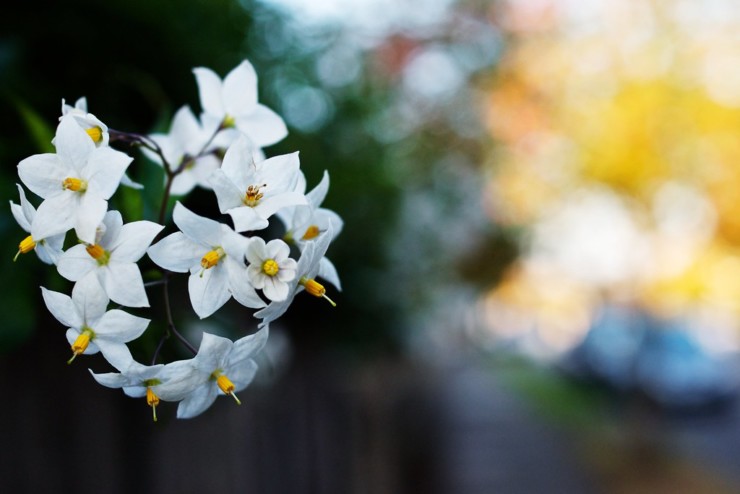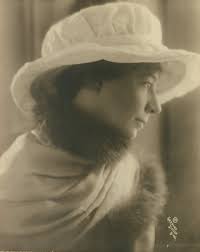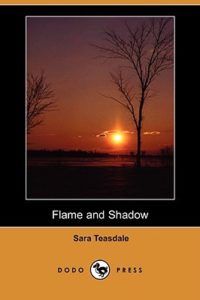
In her lifetime, poet Sara Teasdale (1884-1933) was popular with the public and critics alike. Her third poetry collection, Rivers to the Sea (1915), was a bestseller; her fourth, Love Songs (1917), won what eventually was named the Pulitzer Prize for Poetry. Her final collection, Strange Victory (1933), was published after her death and was well received by critics.
Her poetry gradually fell out of critical favor. I read her poems in English literature textbooks in high school and college, but her work was fast disappearing from those sources by the 1980s. (Critics and scholars must get suspicious if something is popular with the public.) Recently, her work has begun to make something of a comeback, and rightfully so.
And just in time for a live Tweetspeak Twitter party, but without Twitter.
Tweetspeak Poetry was born on Twitter in 2009; you’ll be hearing more about our 10th anniversary next month. It started as a poetry party, with prompts from Susan Goldsmith Wooldridge’s poemcrazy, then, later, a number of poetry, fiction, and non-fiction texts. Quite a few have been held over the years, but none of the parties were actually “live and in person.”

Sara Teasdale
Until this past August. A Tweetspeak Poetry retreat at The Center at Mariandale in Ossining, New York, included a live poetry party, similar to what happens on Twitter but with participants gathered in a room (and without Twitter). Two sources provided the improv lines. First, throughout the retreat, people put lines they’d written in response to the retreat memory poem (Barter by Sara Teasdale) in a poetry basket left on the workshop table.
Second, the live improv involved a Google doc into which three “Twitter executives” typed—one prompter, and two “tweet collectors.” The Google doc was projected onto a large screen, so all participants, seated in a half circle, could see the screen. Similar to a Twitter party, the poets in attendance would write to the prompts but also to each other’s lines as they saw them appear on the screen. When a poet had finished a line, they had to call out, “Send tweet!” and one of the two tweet collectors would then run to get the line from them, then type it into the Google doc.
It was sweet chaos, just as a Twitter party is. But it had the added benefit of being funnier and making the tweet collectors get a little out of breath (which, noted one, the poets seemed to relish, as they held their “tweets” high and waved them around). The Twitter executives engaged in a bit of amusing “pushing each other around, their Google doc entries sometimes colliding and displacing each other’s position in the document. One participant noted that it felt like Lucy and Ethel’s chocolate candy assembly-line episode.
No one stuffed chocolates in their mouth, but here are the first five poems that were created. Next week, we’ll have the last five poems.
Flame and Shadow
By Michelle Ortega, Rhonda Owen, Tania Runyan, Megan Willome, Sandra Heska King, Callie Feyen, Laura Brown, Sonia Joie, Sara Barkat, L.L. Barkat, and Will Willingham; edited by Glynn Young. Prompts courtesy of Sara Teasdale (Flame and Shadow, 1920).
Flowers’ blue flame
Flowers blue as cobalt,
blue flowers, bloomed in flame,
flicker in the garden, igniting
the breeze.

taking me into its heart, then its root.
The blue butterfly has the answer.
What else can you question in blue?
Cobalt tile, cool under my bare feet,
answer the flames, ignite them with rain,
ignite, boil, sink the flames in cobalt.
What’s the question? I am an answer.
Where will you find me, myself
in blue dreams?
There are no real questions.
There are only answers to your dreams.
Tonight, I am a question, posed
by the blue flame.
Tonight, I am my own question,
answered by the blue flame.
Howling loons
Across the torpid pond, the loons howl,
howl in the dark, watching echoes sink
shine, shimmer, glimmer, glisten.
Listen. Tonight, we know our fear.
Find me where the loon settles to sing,
drawing secrets from the fire,
its orange flame a dream,
flickering in the woods.
Making angels in the coal dust
Making angels in the coal dust,
writing letters in the coal dust,
I became myself in the middle
of a coal dust labyrinth.
My dreams glimmered in coal dust,
glimmered in coal, turning to purple,
awakening in a pool of purple dust,
awakening as an angel in the coal dust.
In the silver light after a storm,
I was stuck in the labyrinth.
I lost my mind in the labyrinth,
my mind of dust, of coal, of letters.
The letter in the coal dust
can be rearranged to spell your secret,
to spell me. crushing what’s left of my soul.
I became the labyrinth;
I became the letters in the dust.
Kisses in Connecticut
Teasdale said it first:
“The moon was coming over
the blue Connecticut hills.”
And I caught a glimmer of it in Illinois.
It was a suburban Sasquatch serenade,
Sasquatch singing like jackhammers
in a cobalt sky, whirling and singing
“Kiss me under the purple moon,
“Kiss me in Connecticut,
“Please don’t recycle my kisses.”
In Connecticut, the kisses recycle
in single stream.
It’s okay if you want to reuse them,
but please do not reduce them.
The moon is a forward thing
Walking into a bar, the moon
kissed an opera singer
stepping on a rusted nail,
awakening its rusted heart.
“You are the semicolon
in a storm of commas,”
the opera singer said.
“You are welcome,” said the moon,
drawing a star from its fallen heart.
“But I think I lost you and my phone.”
Photo by Nana B Agyei, Creative Commons, via Flickr. Post by Glynn Young.
__________________________

“I require all our incoming poetry students—in the MFA I direct—to buy and read this book.”
—Jeanetta Calhoun Mish
- “Horace: Poet on a Volcano” by Peter Stothard - September 16, 2025
- Poets and Poems: The Three Collections of Pasquale Trozzolo - September 11, 2025
- Poets and Poems: Boris Dralyuk and “My Hollywood” - September 9, 2025
L.L. Barkat says
Thanks for weaving these, Glynn. I like them a lot, and they definitely have a slightly different quality from the ones we do on Twitter (maybe slightly more formal?). Yet, they have the same sense of surprising depth. It really is wonderful to see the way these poems come together from lines that are not written all at once by the same person. 🙂
Now I’m thinking that for our 10th birthday year, we do need to have a few more Twitter parties! 🙂
LW Willingham says
Nice work, Glynn. 🙂 It was a lively time, those twitter birds flying around to gather the “sent tweets.”
Sandra Heska King says
What a fun time this was! I wish you could have been there. Thanks for piecing together all our tweetie words. A fine feathered job as usual.
And yes. More Twitter parties, please.
Donna Falcone says
Beautiful! The in person dynamic must have felt very different! Glynn you are a MWW (master wordsweaver).
Rhonda says
These are fabulous! Who knew we’d be so creative en masse. Well, somebody knew (Will, Laura, right?). This was a definite highlight of the gathering. I may reactivate my Twitter account so I can join the next Twitter party. OK, probably not, but I will definitely consider it.
Mega-thanks for pulling our “tweets” together for this collection.